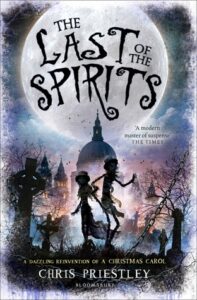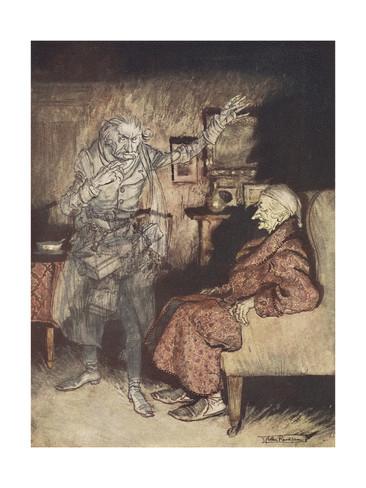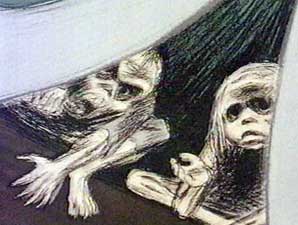In December 2017 we wrote a letter and, enclosing a book, sent it to Theresa May, British Prime Minister. The letter set out the impact of library closures, the loss of employed, qualified librarians and the loss of funding for the purchase of new books, on the children and adults who use them today, on the future of literacy in this country and also on the British book industry as a whole. This is what we wrote:
Dear Mrs May,
A reminder from a Christmas past that our actions foreshadow certain ends
I’m sure you know and love Charles Dickens’ A Christmas Carol as much as we do.  When we meet the towering, benevolent Ghost of Christmas Present, hidden in his robes we glimpse two disconcertingly withered children. The spirit identifies them as ‘Ignorance’ and ‘Want’. As a little present in this season of goodwill, we enclose a wonderful book, The Last of the Spirits, by one of our favourite authors, Chris Priestley. With the narrative weaving in and out of the events that take place in A Christmas Carol, The Last of the Spirits tells the tale of these two strange children, and how they came to be enclosed in the folds of the spirit’s robes. Chris Priestley’s books are among our best sellers; his formidable skill as a storyteller is adored, and the quality of his writing is admired by adults and children alike. For this and their ability to lead readers to explore other great works of literature, from Dickens to Coleridge and Mary Shelley, his work is also high on the list of books we recommend and supply to our local county and school libraries.
When we meet the towering, benevolent Ghost of Christmas Present, hidden in his robes we glimpse two disconcertingly withered children. The spirit identifies them as ‘Ignorance’ and ‘Want’. As a little present in this season of goodwill, we enclose a wonderful book, The Last of the Spirits, by one of our favourite authors, Chris Priestley. With the narrative weaving in and out of the events that take place in A Christmas Carol, The Last of the Spirits tells the tale of these two strange children, and how they came to be enclosed in the folds of the spirit’s robes. Chris Priestley’s books are among our best sellers; his formidable skill as a storyteller is adored, and the quality of his writing is admired by adults and children alike. For this and their ability to lead readers to explore other great works of literature, from Dickens to Coleridge and Mary Shelley, his work is also high on the list of books we recommend and supply to our local county and school libraries.

Scrooge and Marley’s Ghost, by Arthur Rackham, 1915
Our libraries stand as sentinels against ignorance in society. They also have a long history as places of sanctuary. At this time, when our children are bombarded by fleeting images, peer-group pressure, abbreviated language and dubious information on social media, we need libraries more than ever. All people, particularly children, need somewhere they can gain the confidence to choose what is right for them, to seek out information from verified sources, where they are allowed to take their time and absorb information at their own pace. Libraries offer a unique combination of safety and unfettered freedom. For so many, they have also been the place where discoveries happen, and where lifelong learning is promoted; in a library both children and adults can find inspiration, support and solace. With each book they read, a child’s world becomes a little bigger. They keep alive hope of something beyond that place and time. Libraries teach the value of careful research, and the importance of seeking out other viewpoints. Without robust funding for libraries to purchase books, we will quickly lose access to the many voices, perspectives and opinions of authors, especially those from traditionally under-represented groups. We also stand to lose the many wonderful events organised by libraries, which add light and character to a community. It is wrong that libraries should be pitched against other social services, as if social support of any kind can be compared for value to society. As they always have been in the past, libraries are a vital intervention and investment for present and future generations. If we remain on our present course of closures, and of the casual discarding of trained librarians, then we leave this next generation at the mercy of ignorance. And close on the heels of ignorance comes appalling want.

The Ghost of Christmas Present, by John Leech, 1st Edition of A Christmas Carol, 17th December 1843
This is the moment at which we need to choose the right path – and in the full understanding that our choice will create a wave of events that runs far beyond our immediate sight. The closing of libraries and the loss of librarians creates pressures elsewhere our in society and in our economy. The choice we make about town and school libraries will influence the future of the bookselling industry itself in the long term. Bookshops provide employment for 24,440 people in the UK directly, and a great many more indirectly as creators, editors and publishers of books. Furthermore, the contribution to GDP is most recently estimated at between £415m and £450m (CEBR 2017), with the UK being a global leader in the export of books. It is libraries staffed by trained librarians that make both readers and, therefore, our future writers and illustrators. Without future readers this substantial and historically important industry will diminish. It is the libraries too that, in the past, have bought significant numbers of books and made them available to a far wider reach of society than bookshops alone could manage.  We find very often that the recommendation of a librarian leads a child to a bookshop, to find and buy more work by an author they’ve discovered through a library. Selling books to libraries is a small part of our own business, but it is of immeasurable importance, not only to the nation’s literacy, but to the health of the British book industry. Libraries are the mutual friends of publishers, booksellers and authors – their underfunding and closure is a concern shared by all parts of this industry. Already, England has the lowest literacy standards in the world (OECD 2017), with 1 in 7 adults lacking basic literacy skills – figures that give us a glimpse of a bleak future if we remain on this destructive course. We really cannot afford as a nation to lose our libraries or our librarians, together they form one of the foundation stones of our culture. Removing the support of libraries from our children’s lives feels like a deep injustice, perceived and felt all the more finely for the knowledge that it is happening while we lament great want of literacy.
We find very often that the recommendation of a librarian leads a child to a bookshop, to find and buy more work by an author they’ve discovered through a library. Selling books to libraries is a small part of our own business, but it is of immeasurable importance, not only to the nation’s literacy, but to the health of the British book industry. Libraries are the mutual friends of publishers, booksellers and authors – their underfunding and closure is a concern shared by all parts of this industry. Already, England has the lowest literacy standards in the world (OECD 2017), with 1 in 7 adults lacking basic literacy skills – figures that give us a glimpse of a bleak future if we remain on this destructive course. We really cannot afford as a nation to lose our libraries or our librarians, together they form one of the foundation stones of our culture. Removing the support of libraries from our children’s lives feels like a deep injustice, perceived and felt all the more finely for the knowledge that it is happening while we lament great want of literacy.

The Ghost of Christmas Yet to Come, by PJ Lynch.
As well as being a really wonderful read, The Last of the Spirits shows us very clearly where the path dictated by ignorance can lead. Today we use the word ‘ignorance’ as an insult, in our vernacular it has come to be something more like wilful stupidity. However, its true meaning has more to do with illiteracy, inexperience and unfamiliarity. Ignorance is something against which we can guard – and libraries are the guardians. Charles Dickens himself was a passionate campaigner and advocate for, amongst many other things, education for all children and access to education as a means of lifting families out of poverty. He would be appalled to see a future in which libraries are abandoned and the importance of librarians disdained. At the end of The Last of the Spirits, the young boy so nearly destroyed by ignorance, creates a library that provides books and courses of education for the poor. Above the door of his library is carved in Portland stone: ‘Ignorance and Want: beware them both, but beware Ignorance most of all.’
I hope that you will consider these matters very carefully and make the protection of our libraries and librarians a priority. Enjoy the book, it is an extraordinary piece of work and adds considerably to Dickens’ tale which, I’m sure you’ll agree, is no small achievement.
Yours sincerely
Tamsin Rosewell and Judy Brook
Kenilworth Books
 has found great success with his novels for readers of all ages. He is the author of the brilliant Tales of Terror series which draws on centuries of supernatural literature; The Dead Men Stood Together, a wonderful story woven around Coleridge’s The Rime of the Ancient Mariner; and the fascinating exploration of Mary Shelley’s Frankenstein, Mister Creecher, to name but a few. He is also a talented artist and illustrator. His cartoons have been published in the Independent and other national newspapers. You can find out more about his work here: http://www.chrispriestleybooks.com/ The Last of the Spirits is published by Bloomsbury.
has found great success with his novels for readers of all ages. He is the author of the brilliant Tales of Terror series which draws on centuries of supernatural literature; The Dead Men Stood Together, a wonderful story woven around Coleridge’s The Rime of the Ancient Mariner; and the fascinating exploration of Mary Shelley’s Frankenstein, Mister Creecher, to name but a few. He is also a talented artist and illustrator. His cartoons have been published in the Independent and other national newspapers. You can find out more about his work here: http://www.chrispriestleybooks.com/ The Last of the Spirits is published by Bloomsbury.